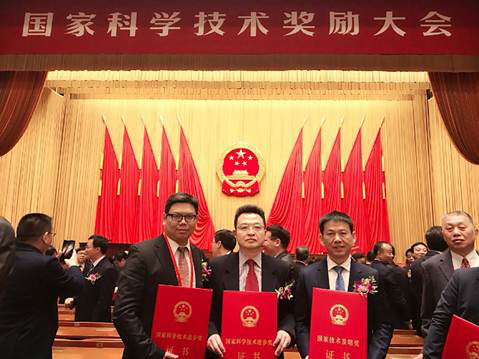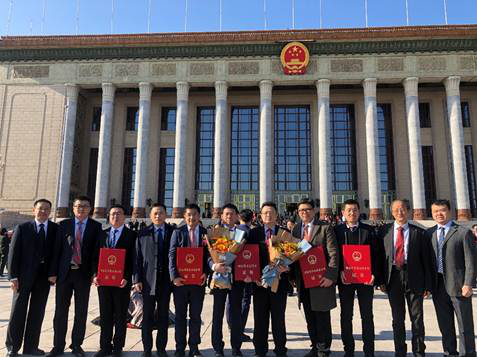The National Science and Technology Award Conference of China for the year 2019 was grandly held at the Great Hall of the People in Beijing on the morning of Jan 10, 2020. Chinese President Xi Jinping, Premier Li Keqiang, Wang Huning, Vice Premier Han Zheng, along with other leaders of the Communist Party of China (CPC) and the state government, attended the annual ceremony and presented awards to the recipients. Three researches led by Wuhan University (WHU) won the national awards, including the first and second prizes of State Scientific and Technological Progress Award, and the second prize of State Technological Invention Award respectively. Other three programs WHU participated in were also on the list, including one honored with the special prize of State Scientific and Technological Progress Award.

WHU’s project “Key Technologies for Establishing High-Precision Digital Height Datum in China and Their Application” gained the first prize of State Scientific and Technological Progress Award. It was conducted by Prof. Li Jiancheng, academician of the Chinese Academy of Engineering and professor of WHU School of Geodesy and Geomatics. To modernize height datum and improve positioning system in China, the study figured out a rigorous formulae of the boundary value problem (BVP) in Stokes-Helmert's scheme and it’s application. By forming an integral technical system of high-resolution digital height datum, with its proposed model to sustain and measure the datum via digitalization, the research pioneered in China’s modernization in this field. The results have been applied to natural resource management, urban planning, water conservancy, transportation, geophysical exploration and other industries. Its quick and accurate estimating in high altitude areas has the potential to reap huge economic and social benefits for the people.
Prof. Wang Xinghuan from Zhongnan Hospital of WHU presided over another award-winning project “Key Principles and Clinical Applications of Minimally Invasive Prostate Resection by Plasma Kinetics”, which was honored with the second prize of State Technological Invention Award. The investigation established the surgical system of minimally invasive prostate resection using plasma kinetics. It redesigned intracavity medical devices with complete independent intellectual property rights, unveiling the historical breakthrough of prostatectomy from electric to plasma kinetic technology. The invention made China a leading country in this field as the results were adopted into official guidelines in developed Western countries. Its proposed method has been applied in more than 5,000 hospitals, with half of the county-level ones covered. The promotion of high-quality medical care boosted the Healthy China Initiative which entails “access to treatment of serious illness within the county”.
The “Real-Time Orbit Determination System of Domestically-Made Satellites with Almost Centimeter-Level Precision and Its Application in Major Projects” program, directed by Prof. Zhao Qile from Global Navigation Satellite System (GNSS) Center of WHU, won the second prize of State Scientific and Technological Progress Award. This work established the theory, method and technology of precise orbit determination for domestically-made satellites, and developed payloads to determine the satellite orbit. It also accomplished its real-time system with almost centimeter-level precision, which has been successfully applied to national major projects such as China’s second-generation satellite navigation system (officially called the BeiDou Navigation Satellite System, or BDS), China High-resolution Earth Observation System (CHEOS) and China's Lunar Exploration Project (CLEP). By working out real-time orbit determination technology of domestically-made satellites with almost centimeter-level precision, payloads to determine the satellite orbit and software system that are all independent and controllable, the endeavor made great contributions to high-precision application of BDS, as well as high-precision and high-resolution mapping and remote sensing using Earth observation satellites.
And among the three award-winning projects WHU participated in, the “Yangtze River Three Gorges Hydropower Project” gained the special prize of State Scientific and Technological Progress Award; the “Construction of the TCM Vessel-Collateral Theory and Its Guidance for Prevention and Treatment of Vasculopathy” research, where Prof. Huang Congxin from Renmin Hospital of WHU engaged, won its first prize; the “Key Technologies for Prediction, Monitoring and Early Warning of Potential Large Landslides in Mountainous Areas of Western China” program, which Prof. Liao Mingsheng from the State Key Laboratory of Information Engineering in Surveying, Mapping and Remote Sensing took part in, received the second prize.

It is reported that the 2019 National Science and Technology Awards conferred distinctions to 296 projects and 12 researchers: 46 projects won the State Natural Science Award, with one first prize and 45 second prizes; 65 projects the State Technological Invention Award, with 3 first prizes and 62 second prizes; 185 the State Scientific and Technological Progress Award, with 3 special prizes and 22 first prizes (including an Innovation Team Award) and 160 second prizes; Huang Xuhua and Zeng Qingcun, both academicians, were granted the State Preeminent Science and Technology Awards; and 10 foreign scientists were conferred with the China International Science and Technology Cooperation Award.
Rewritten by Zhou Siyan
Edited by Shen Yuxi and Hu Sijia